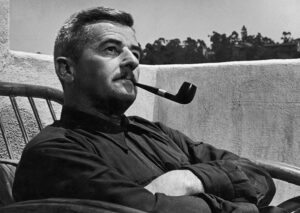Headlines
Faulkner Goes to Hollywood and Meets Clark Gable
*This article originally appeared in The Oxford SO & SO.
By Revia Perrigin
Columbus, MS
cowgirljenks@hotmail.com
William Faulkner spent most of his life in Oxford, Mississippi. His finances were the reason for his going to Hollywood. He left his family behind. He won the Nobel Prize for “The Sound And The Fury” (1929) and “As I Lay Dying” (1930). His novel “Sanctuary” was a success in 1932.

William Faulkner met Clark Gable once on a hunting adventure.
Faulkner had hoped to receive $4,000 (about $64,000 in today’s money) but was told he wouldn’t receive any of it. His publisher, Cape and Smith, had gone bankrupt. William Faulkner was broke.
Word got around Oxford and a store owner refused to take his three dollar check. Metro-Goldwyn-Mayer (MGM) made him an offer to come to Hollywood and write movie scripts. Faulkner didn’t have the money to send a telegram accepting the offer. MGM paid for his ticket and a few days later he arrived in Culver City.
Faulkner’s first day at work was an auspicious one. He showed up quite drunk on Saturday, as the work day was ending. MGM’s executive producer, Samuel Marx, told him, “We’re putting you on a Wallace Beery picture.”
“Who’s he?” replied Faulkner, referring to the studio’s great star and Gloria Swanson’s leading man. “I’ve got an idea for Mickey Mouse.”
Faulkner did get around to writing screenplays. It was an adjustment on both sides. He received official credits for just six theatrical releases, five of them with director Howard Hawks.
Sam Marx told a Hollywood biographer that Faulkner and director Howard Hawks were on a hunting trip with Clark Gable. Faulkner and Hawks were discussing literature. Clark Gable asked Faulkner whom he considered the best contemporary writers. Faulkner replied, “Ernest Hemingway, Willa Cather, Thomas Mann, and William Faulkner.”
Clark Gable did a double take and asked, “Do you write, Mr. Faulkner?”

Clark Gable. Photo courtesy of Wikimedia Commons.
“Yes, Mr. Gable”, was his reply. “What do you do?”
Faulkner wrote a script that resulted in “Today We Live.” The movie starred Gary Cooper and Joan Crawford. It was released in 1933. Besides receiving the Nobel Prize for Literature in 1949, he received the Pulitzer Prize for “A Fable” in 1955 and “The Reivers”, which was published before his death on July 6, 1962.
It is often said when people move to Hollywood, they lose their identity. Faulkner did not. He had his pipe, tobacco, and bourbon, and he could still hunt.











































Jay Mitchell
July 18, 2018 at 1:10 pm
I LOVE this story.
Tony Penney
July 18, 2018 at 8:34 pm
Love it! Never duel with a wordsmith.